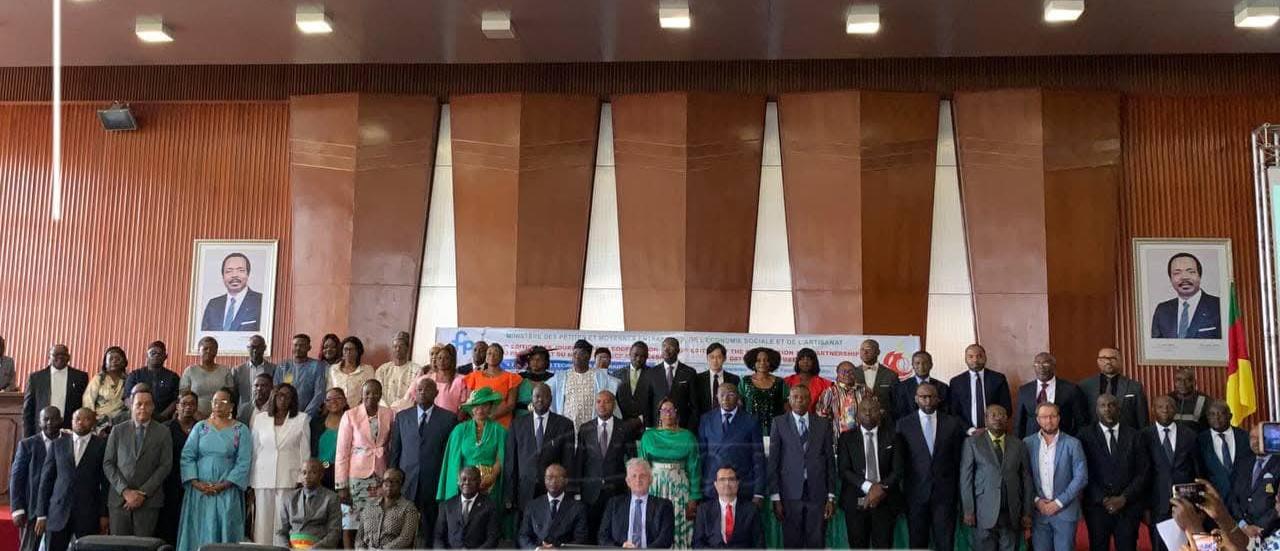The government has pledged fresh support for the country’s struggling small and medium-sized enterprises SMEs, announcing a CFA 2.5 billion injection to modernize production tools and improve competitiveness. The announcement was made during a two-day gathering Yaoundé for the third edition of the Cooperation and Partnership Days, a high-level forum aimed at accelerating SME growth through stronger collaboration with international development.
Cameroon’s government, in partnership with international development actors, has embarked on a bold move to modernize its Small and Medium-Sized Enterprises, SMEs, sector, widely regarded as the backbone of the national economy. This drive comes as part of the third edition of the Cooperation and Partnership Days, hosted by the Ministry of Small and Medium-Sized Enterprises, Social Economy and Handicrafts, under the leadership of Minister Achille Basilekin III.
Held in Yaoundé under the theme “Modernizing Local Production Tools: Contribution of Technical and Financial Partners,” the 2025 edition of the forum brings together major players in the public and private sectors, financial institutions, bilateral and multilateral development partners, and SME stakeholders to collectively strategize on ways to enhance the performance and sustainability of Cameroon’s enterprise ecosystem. “We believe that we cannot talk about improving the manufacturing of products if we are not improving the tools, management, and productive capacity of our SMEs,” Minister Basilekin stated during his opening speech. “This forum is an opportunity to coordinate action, share resources, and identify what tools are available to fast-track modernization.”
SMEs in distress
SMEs make up over 90% of the country’s economic fabric, spanning agriculture, manufacturing, services, and creative industries. However, many of them continue to struggle with persistent challenges: Outdated and inefficient production tools, Limited access to credit and financing, Insufficient skilled labor, Low adoption of digital technologies, Restricted access to global markets. These hurdles have stifled innovation, limited productivity, and made local enterprises less competitive in a rapidly evolving global economy.
Development partners rally support
The event saw strong representation from Cameroon’s international allies. Raymond Tavares, representative of the United Nations System, emphasized that digitalization and innovation are essential if Cameroonian SMEs are to thrive on a global scale. “You are not competitive on the international market if you have no access to digital growth,” he remarked.
Echoing this, the European Union’s Resident Representative, Jean-Marc Chartagnier, reaffirmed the EU’s commitment to supporting value chain development, capacity building, and green industrialization in Cameroon. Both institutions stressed the importance of strengthening not just financing mechanisms, but also the innovation ecosystems that help SMEs evolve from survivalist ventures into globally viable businesses.
Government pledges CFA 2.5 billion injection
In a major announcement, Minister Achille Basilekin III disclosed that the government will inject 2.5 billion CFA francs into the SME Bank to provide funding for micro, small, and medium-sized enterprises. This financial lifeline is aimed at easing access to capital, a long-standing barrier to growth for many local businesses. The minister also highlighted that the move aligns with the government’s Import Substitution Policy, a long-term plan to reduce dependence on foreign goods and promote “Made in Cameroon” products by empowering local producers. “This fund will not just support access to credit, but also back the acquisition of production equipment and the adoption of best management practices,” he added.
Promoting inclusive industrialization and local Content
Throughout the forum, discussions centered on creating inclusive opportunities for startups, women-led enterprises, and youth entrepreneurs, key demographics that make up the growing informal and creative sectors. Stakeholders called for better alignment between academia, vocational training, and SME needs, to close the skills gap. A special segment was also dedicated to promoting collaboration between established businesses and emerging innovators, a strategy seen as key to strengthening value chains and enabling technology transfer.
Outcomes and expectations
The Cooperation and Partnership Days serve as a policy incubator and investment platform, where actionable commitments are expected to emerge. Recommendations from the 2025 edition will feed into the government’s National Development Strategy, SND30, which prioritizes private sector-led growth, digital transformation, and local content development. As Cameroon’s economy continues to face pressure from global market volatility and internal structural limitations, revitalizing the SME sector is no longer optional, it is imperative.
For entrepreneurs like Evelyne Ndzie, who runs a small agro-processing unit in Bafoussam, these developments bring hope: “Access to finance and better machines has been a dream. If this initiative reaches us in the field, we can grow and even export one day,” she said. As the 2025 Cooperation and Partnership Days unfolds, Cameroonian hope it may well mark a turning point in county’s economic transformation if its promises are matched with action.

